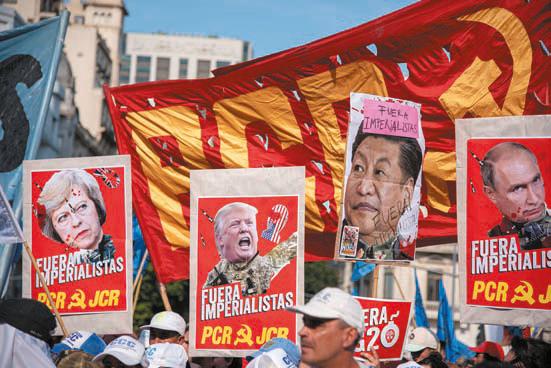The Group of Twenty (G-20) finance ministers and central bank governors was established in 1999 to bring
Question:
The Group of Twenty (G-20) finance ministers and central bank governors was established in 1999 to bring together important industrialized and developing economies to discuss key issues in the global economy on a regular basis. The G-20 was created as a response both to the financial crises of the late 1990s and to a growing recognition that key emerging-market countries (represented in the G-8)
were not adequately included in the core of global economic discussion and governance. The inaugural meeting of the G-20 took place in Berlin, on 15–16 December 1999, hosted by German and Canadian finance ministers. The G-20 is made up of the finance ministers and central bank governors of 19 countries:

Argentina, Australia, Brazil, Canada, China, France, Germany, India, Indonesia, Italy, Japan, Mexico, Russia, Saudi Arabia, South Africa, South Korea, Turkey, the UK, the US and the European Union (the 20th member of the G-20).
On 30 November–1 December 2018, the world leaders from the G-20 countries – representing 85 per cent of the world’s output – met in Buenos Aires, Argentina. They came together in the shadow of Brexit and the US–China trade war.
As has occurred at other World Bank or G-8 meetings, there were massive protests and demonstrations planned.
The motives for protests at G-20 meetings are multifaceted: the protesters range from anti-war campaigners and environmentalists (wanting the G-20 to consider moving away from fossil fuels) to anti-globalization activists. The arguments for and against globalization are outlined in the following.
For globalization
For consumers and avowed capitalists, globalization is largely a good thing. The fall of protectionist barriers has stimulated free movement of capital and paved the way for companies to set up several bases around the world. The rise of the internet and recent advances in telecommunications have spurred on the already surging train. Vigorous trade has made for more choice on the high street, greater spending, rising living standards and a growth in international travel. Supporters of globalization say it has promoted information exchange, led to a greater understanding of other cultures and allowed democracy to triumph in most countries.
Against globalization
As the street protests indicate, there is a growing opposition to the forces of globalization. The anti-globalization movement developed in the late twentieth century to combat the globalization of corporate economic activity and the free trade with developing nations that might result from such activity.
Critics say the West’s gain has been at the expense of developing countries. Demonstrators say rich countries should forgive the debts of the poorest nations. Generally speaking, protesters believe that these global institutions and agreements (WTO, World Bank/IMF, G-8, G-20) undermine local decision-
making methods. Many governments and free trade institutions are seen as acting for the good of transnational (or multinational) corporations (e.g.
Microsoft, Unilever).
The already low share of the global income of the poorest people in the world has dropped even more in the past decade, but in the developed world not everyone has been a winner. The freedoms granted by globalization have led to increased insecurity in the workplace. Manual workers, in particular, are under threat as companies shift their production lines overseas to low-wage economies.
Developing countries are demanding that the EU and the US cut back their agricultural subsidy programmes and provide market access for products like Central American sugar and Brazilian orange juice. However, as agribusiness is focal in several EU countries and in the US, and with thousands of agricultural jobs at stake in these areas, it is unlikely that the US or the EU administration will negotiate seriously on these issues in the near future.
At the heart of the demonstrators’ concerns is the fact that huge transnational companies are becoming more powerful and influential than democratically elected governments, putting shareholder interests above those of communities and even customers. Ecological campaigners say corporations are disregarding the environment in the stampede for worldwide mega-profits. Human rights groups say corporate power is restricting individual freedom. Even business people behind small firms have sympathy for the movement, afraid as they are that global economies of scale will put them out of work.
The mere fact that the debate can take place simultaneously across countries and continents, however, may well show that the celebrated global village is already here.
Questions
1. What were the key arguments of the anti-globalization groups?
2. How could these protests affect the operations of multinational companies?
3. How could the G-20 do a better marketing job in communicating its views to the global audience?
Step by Step Answer:






